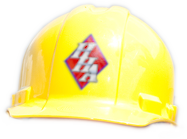1. WHAT ARE THE BENEFITS OF USING GEOTHERMAL ENERGY?
Several attributes make it a good source of energy.
First, it's clean. Energy can be extracted without burning a fossil fuel such as coal, gas, or oil. Geothermal fields produce only about one-sixth of the carbon dioxide that a relatively clean natural-gas-fueled power plant produces, and very little if any, of the nitrous oxide or sulfur-bearing gases. Binary plants, which are closed cycle operations, release essentially no emissions.
Geothermal energy is available 24 hours a day, 365 days a year. Geothermal power plants have average availabilities of 90% or higher, compared to about 75% for coal plants.
Geothermal power is homegrown, reducing our dependence on foreign oil.
2. WHY IS GEOTHERMAL ENERGY A RENEWABLE RESOURCE?
Because its source is the almost unlimited amount of heat generated by the Earth's core. Even in geothermal areas dependent on a reservoir of hot water, the volume taken out can be reinjected, making it a sustainable energy source.
3. WHERE IS GEOTHERMAL ENERGY AVAILABLE?
Hydrothermal resources - reservoirs of steam or hot water - are available primarily in the western states, Alaska, and Hawaii. However, Earth energy can be tapped almost anywhere with geothermal heat pumps and direct-use applications. Other enormous and world-wide geothermal resources - hot dry rock and magma, for example - are awaiting further technology development.
4. WHAT ARE THE ENVIRONMENTAL IMPACTS OF USING GEOTHERMAL ENERGY?
Geothermal technologies offer many environmental advantages over conventional power generation:
Emissions are low. Only excess steam is emitted by geothermal flash plants. No air emissions or liquids are discharged by binary geothermal plants, which are projected to become the dominant technology in the near future.
Salts and dissolved minerals contained in geothermal fluids are usually reinjected with excess water back into the reservoir at a depth well below groundwater aquifers. This recycles the geothermal water and replenishes the reservoir. The City of Santa Rosa, California, pipes the city's treated wastewater up to The Geysers power plants to be used for reinjection fluid. This system will prolong the life of the reservoir as it recycles the treated wastewater.
Some geothermal plants do produce some solid materials, or sludges, that require disposal in approved sites. Some of these solids are now being extracted for sale (zinc, silica, and sulfur, for example), making the resource even more valuable and environmentally friendly.
5. WHAT IS THE VISUAL IMPACT OF GEOTHERMAL TECHNOLOGIES?
District heating systems and geothermal heat pumps are easily integrated into communities with almost no visual impact. Geothermal power plants use relatively small acreages, and don't require storage, transportation, or combustion of fuels. Either no emissions or just steam are visible. These qualities reduce the overall visual impact of power plants in scenic regions.
6. IS IT POSSIBLE TO DEPLETE GEOTHERMAL RESERVOIRS?
The long-term sustainability of geothermal energy production has been demonstrated at the Lardarello field in Italy since 1913, at the Wairakei field in New Zealand since 1958, and at The Geysers field in California since 1960. Pressure and production declines have been experienced at some plants, and operators have begun reinjecting water to maintain reservoir pressure. The City of Santa Rosa, California, pipes its treated wastewater up to The Geysers to be used as reinjection fluid, thereby prolonging the life of the reservoir while recycling the treated wastewater.
7. HOW MUCH DOES GEOTHERMAL ENERGY COST PER KILOWATT-HOUR (KWH)?
At The Geysers, power is sold at $0.03 to $0.035 per kWh. A power plant built today would probably require about $0.05 per kWh. Some plants can charge more during peak demand periods.
Source Credit: https://www.energy.gov/eere/geothermal/geothermal-faqs
About the Author
Randall and Kevin Harbin are the leaders at Harbin heating and air conditioning Inc. Harbin Heating and air conditioning Inc. has been serving clients for 30 years now in the area. Harbin Heating and Air Conditioning Inc. Areas serviced : Corinth ms, Iuka Ms, Selmer TN, Savannah TN, Cherokee Al. Click here for an entire list of our service area.




